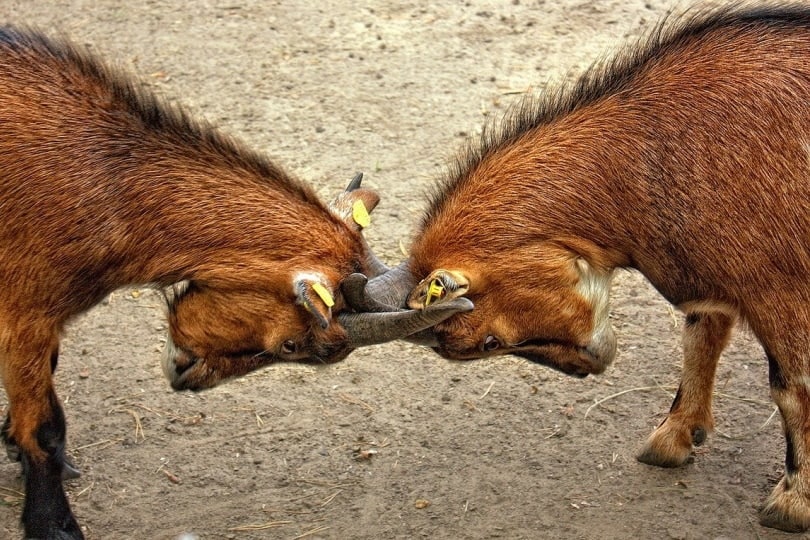Why They Headbutt Humans
How To Reduce Headbutting
Other Strange Goat Behaviors
[/jump-links]
Although watching goats slam their heads together may seem barbaric and strange, headbutting is not an abnormal activity. Younger goats headbutt each other as a way to play and release pent-up energy. When adults headbutt, they’re trying to establish dominance, relieve stress, or send a warning to another rival. Whether they’re roaming free in the wild or enclosed in fencing, goats establish a hierarchy that places the most dominant males at the top leadership positions. Let’s learn more about goats and headbutting in this article.

Built for Headbutting
Unlike mammals that hunt and forage by themselves after leaving their mothers, goats prefer to follow a leader that can keep them alert to danger and protect the group. The ability to headbutt is built into a goat’s DNA, and the animal’s skull is designed to absorb a force 60 times more powerful than a human skull.
Every vertebrate animal has small joints called sutures between the bony plates of the skull that look like tiny wavy lines. The sutures of goats and sheep are more complex than other animals, and scientists recently discovered that the joints help absorb the shock on the skull from a headbutt. When a goat headbutts another goat, the force of the blow is distributed more evenly across the skull and does not damage it. However, a goat’s skull is not indestructible, and goats have injured their heads when they’re stressed or ill and slam their heads against steel fences.

Is Headbutting Normal Behavior?
Headbutting is a way of life for goats, but if you notice excessive headbutting in your herd, you have to determine the cause of the behavior to protect the animals. Although the goat’s skull structure is designed to take abuse, repeated headbutts with horned goats can cause punctures in the skin and fractures. If a goat that once seemed calm and well-balanced begins headbutting the herd or attacking animate objects, the source of the new behavior can be related to one of these factors.
Overcrowding
Goats are communal animals that feel safer in a group, but they need plenty of room to graze and relax. When grazing resources become slim, and the goats have to compete for food, they often begin releasing their aggression by headbutting. Goats are eating machines that can level a grassy field in no time, but they aren’t comfortable when living conditions are cramped. Giving the goats more room to graze can put an end to excessive headbutting.
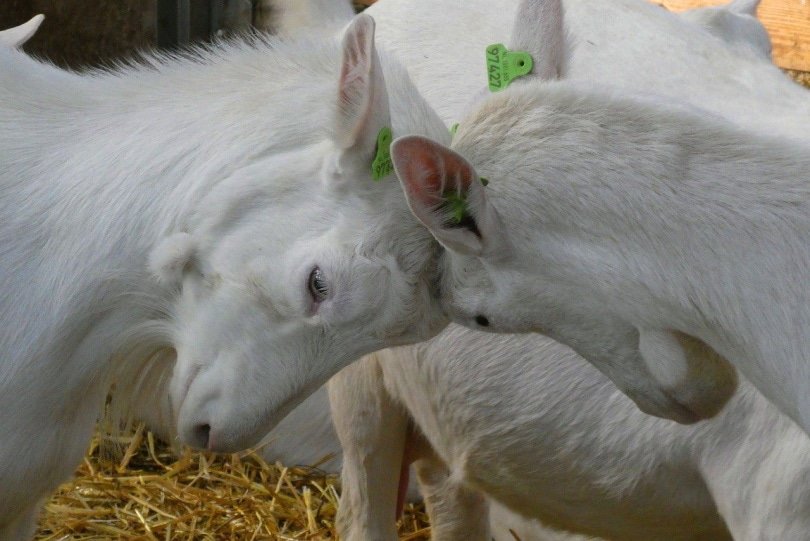
Stress
Like humans, goats experience high levels of stress when they feel uneasy or threatened. If a predator is lurking nearby, the goats can become overstressed and release their tension with headbutting. You can calm down the herd when you determine the source of their discomfort and find a solution. For instance, if a fox is causing distress, you can hunt the animal or trap it and take it to a nature preserve.
Boredom
Headbutting is a great stress reliever for goats, but some animals headbutt more when they’re not mentally stimulated. If the grazing fields are bare and a goat feels isolated from the herd, the animal may try to find something else to occupy its time. Bored goats will begin slamming their heads into fences or other objects as a protest to their mental state. Keeping your goats well-fed and socialized with others in the herd can prevent a temper tantrum from boredom.
Illness
Goats suffering medical conditions sometimes lash out at other goats, humans, or other animals by headbutting. The problem is more common with mature goats that have declining hearing and sight. Goats struggle with fear more than other farm animals, and when their sight and hearing are inadequate, they become frightened when an animal or human approaches. An infection, sore joint, or bone fracture can also cause the animal to become more aggressive and increase its headbutting. Periodic visits from the veterinarian are vital for keeping the herd healthy and mentally balanced.

Why Do Goats Headbutt Humans?
Goats recognize the humans who feed them, and the animals generally have a good relationship with humans. However, a stranger that visits the farm and provokes the herd may be greeted with a forceful headbutt. Headbutting a human is a sign that the goat feels threatened or suspicious. If a goat headbutts its owner, the animal may have a medical condition or an issue with overcrowding. Some goats will give their human handlers a slight nudge with their head as a sign of affection, but a full-on headbutt is not acceptable behavior. Aggressive goats should be isolated from the rest of the herd until the origin of the behavior is determined.
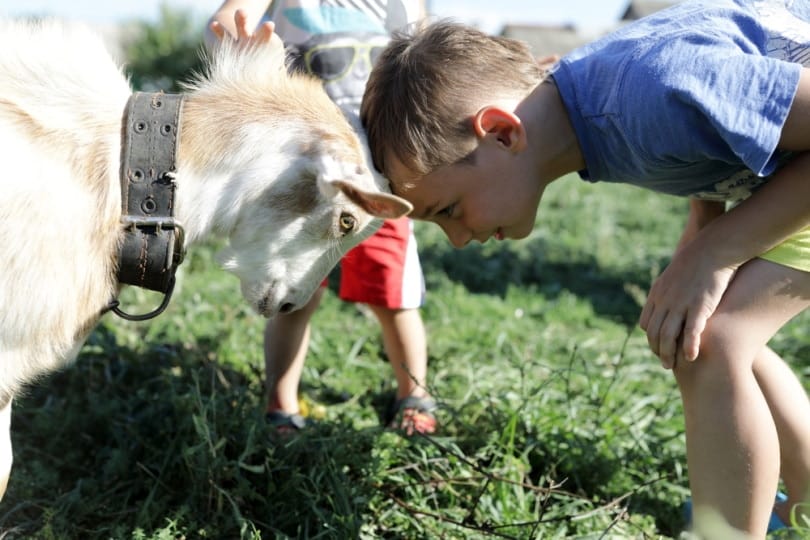
How Do You Reduce Headbutting?
When you own goats, you have to familiarize yourself with what is considered normal behavior. Goats have to blow off steam sometimes by headbutting, but you have to take steps to curb excessive behavior to protect your family and the herd. An aggressive goat can cause significant injuries to an adult or young child. Impacts from a goat’s head are forceful enough, but you also have to worry about damage from their horns.
Isolating misbehaving goats is the ideal way to reduce headbutting. During mating season, male goats often have to be separated to minimize injuries when they’re fighting over females. When an unruly goat’s behavior calms, you can reintroduce it back into the herd.

What Other Strange Behaviors Do Goats Exhibit?
Although managing a goat herd requires a great deal of hard work and perseverance, you’re unlikely to find another group of farm animals as entertaining and strange. Headbutting is only one of the many odd behaviors that goats display, but some of these personality traits are more prevalent in different goat species.
Screaming
The scream from a young goat is often compared to a human baby’s cry. The high-pitched squeal can seem disarming, but it’s a natural occurrence that becomes less pronounced as the animals age. Goats scream when they’re ready to eat, scared, excited, and bored. The animals will cry for almost any reason, and while some are incredibly loud, others emit less thunderous cries. If your herd is fed at dawn, you’ll probably hear them crying just before the sun rises for their breakfast.
Falling Down
Fainting goat syndrome is not a behavior of most goat species, but if you own a Myotonic goat, you’ll notice the animal falling over with its legs sticking straight up. Also referred to as Tennessee Fainting Goats, Myotonics fall over when they sense danger. This fight or flight response is a reflex that causes the animal’s muscles to stiffen temporarily. The goat lays on its back for several seconds and appears stunned, but the goat never loses consciousness, and soon, its back on its feet gobbling grass.
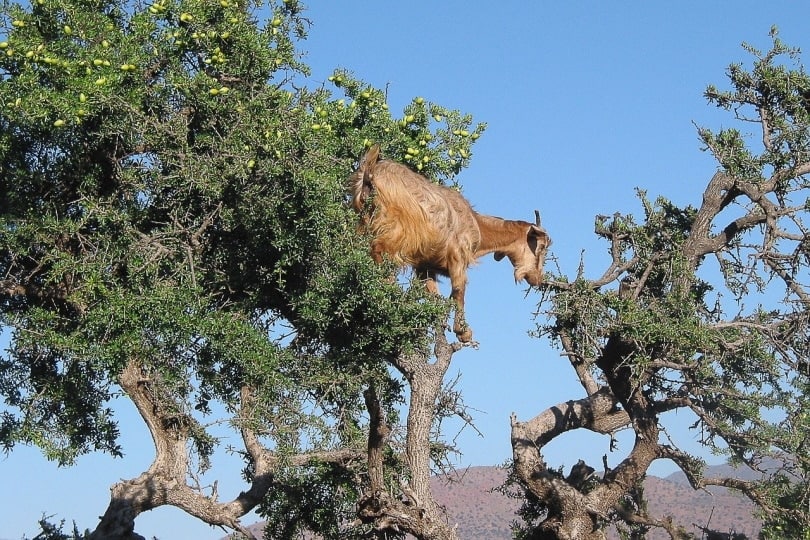
Tree Climbing
Can goats climb trees? The notion seems absurd, and it sounds similar to the “sheep in trees” sketch from a Monty Python episode. Although most goats are incapable of climbing trees, the Moroccan goats are world-famous for scaling trees and munching on Argon fruit. The dry landscape is unsuitable for grazing, and the limber goats adapted to the environment by searching for food in unlikely places. Unfortunately, some goat farmers are trying to capitalize on the behavior by tethering their animals to the trees to attract more tourists.
Urine Drinking
When farm goats drink their urine, it’s usually a sign of a nutritional deficiency. If the animals are well fed and cared for, they won’t resort to drinking urine. However, wild mountain goats have acquired a taste for salty human urine. Before hiking and camping were popular outdoor activities, goats found other sources of salt, but now that human urine is readily available in their area, they drink it because it’s convenient.
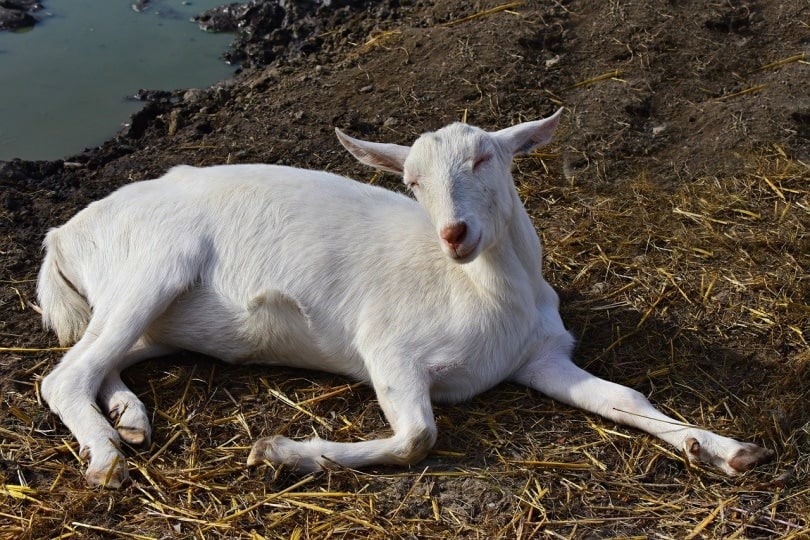

Conclusion
Headbutting and other unique behaviors from goats make the animals amusing to own and raise. When you have a herd, you expect to see headbutting from time to time, but when you notice the frequency and severity of the attacks increasing, you have to isolate the aggressive creatures to protect the herd. With frequent vet inspections, a healthy diet, and caring overlookers, goats can live productive and healthy lives.
- Here’s something interesting about goats: How Do Goats Show Affection to Each Other and Humans? (7 Signs to Look For)
Featured Image Credit: PeterDargatz, Pixabay
